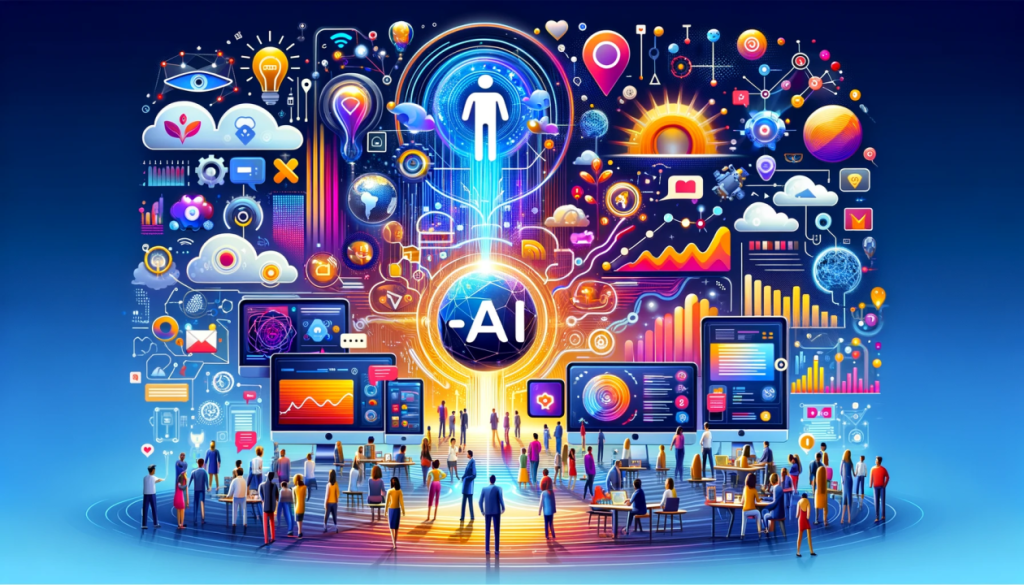Introduction: The Rise of AI in Creating Highly Personalized Experiences for Customers
In today’s digital landscape, personalization is a key driver of customer satisfaction and loyalty. Companies across various industries are increasingly leveraging artificial intelligence (AI) to create highly personalized experiences for their customers. Whether it’s tailoring product recommendations, providing targeted content, or optimizing customer interactions, AI is enabling businesses to connect with consumers on a more individual level.
The integration of AI into personalization is transforming the customer experience (CX) in profound ways. AI systems can analyze massive amounts of data to understand consumer behavior, preferences, and needs in real-time, delivering hyper-personalized experiences that were once unimaginable. By predicting what customers want before they even know it themselves, AI is setting a new standard for customer-centric interactions across e-commerce, entertainment, media, and beyond.
In this article, we’ll explore how AI is revolutionizing personalization, particularly in the realms of e-commerce, content creation, entertainment, and data privacy, while also addressing the ethical considerations that come with such advancements.
AI in E-commerce: How AI is Customizing Product Recommendations and Advertisements
One of the most significant applications of AI-driven personalization is in e-commerce. Retailers and online marketplaces are using AI-powered algorithms to analyze vast amounts of data, such as browsing history, purchase behavior, and demographic information, to customize product recommendations and targeted advertisements.
These AI systems not only recommend products based on what a customer has purchased in the past but also predict what they might be interested in next. For example, if a consumer frequently purchases fitness-related products, an AI algorithm can recommend new workout gear, supplements, or even fitness classes tailored to their preferences. This level of personalization improves conversion rates, enhances the shopping experience, and builds stronger customer relationships.
Dynamic pricing is another area where AI plays a pivotal role. By analyzing real-time market trends, consumer behavior, and competitor pricing, AI systems can adjust prices for products dynamically, ensuring that they are both competitive and appealing to individual shoppers. This creates a more relevant and customized shopping experience, ultimately boosting sales and customer satisfaction.
Moreover, AI-powered chatbots and virtual assistants are helping e-commerce brands provide personalized customer service. These AI-driven tools can recommend products, answer queries, and guide customers through the purchasing process, all while adapting to the customer’s preferences and history.

Personalized Content Creation: How AI Tools Are Creating Content That Resonates with Individual Preferences
Beyond e-commerce, AI is also transforming the way content is created and delivered. In the world of digital marketing, personalized content has become a vital tool for engaging customers. AI-powered tools are being used to craft highly personalized content that speaks directly to an individual’s interests, preferences, and behaviors.
For example, AI-driven content generation tools can analyze social media activity, browsing behavior, and past interactions to create customized email marketing campaigns, blog posts, and even social media ads that are likely to resonate with the target audience. This kind of personalized content not only drives engagement but also enhances brand loyalty and trust.
Natural language processing (NLP) algorithms are also playing a crucial role in personalizing written content. These algorithms can generate product descriptions, articles, and other written materials that feel human and relevant to the specific needs of the consumer. Whether it’s suggesting recipe ideas based on dietary preferences or generating tailored news updates, AI ensures that the content is aligned with the consumer’s current context.
Visual content is another area where AI is creating personalized experiences. Platforms like Instagram and Pinterest use AI to analyze a user’s visual preferences and offer them personalized suggestions for photos, videos, and design ideas. This image recognition technology helps brands create more engaging and relevant visual experiences, which can boost user interaction and time spent on platforms.
AI in Entertainment: Personalized Movie, Music, and Gaming Recommendations
AI’s ability to provide personalized experiences has also taken root in the entertainment industry. Streaming platforms like Netflix, Spotify, and YouTube rely heavily on AI algorithms to recommend movies, TV shows, music, and videos based on a user’s past behavior and preferences.
In movie and TV recommendations, AI systems analyze what users have watched, rated, and interacted with to suggest new content they’re likely to enjoy. This personalized approach makes it easier for consumers to discover new shows or films, keeping them engaged with the platform and improving overall user satisfaction. Moreover, AI can also predict trends and suggest content based on broader cultural shifts or even a user’s mood or time of day.
Music streaming platforms like Spotify use similar algorithms to suggest playlists, albums, and artists tailored to the listener’s musical tastes. By continuously learning from user preferences and feedback, AI can even craft hyper-personalized playlists that evolve with a listener’s changing mood or evolving tastes.
In the world of gaming, AI is also helping to create more personalized experiences. Adaptive game engines learn from players’ actions and adapt the difficulty, storylines, and challenges based on individual preferences, ensuring that the experience is always engaging and dynamic. Whether it’s offering customized missions or providing more personalized rewards, AI is enhancing the overall player experience and creating more immersive environments.
Data Privacy Concerns: The Trade-Off Between Personalization and Data Security
As AI becomes increasingly adept at personalizing customer experiences, concerns around data privacy and security have also intensified. The more personalized an experience becomes, the more data it requires—and this data often includes sensitive personal information such as location, behavioral patterns, and demographic details.
The trade-off between enhanced personalization and the protection of user privacy is one of the most pressing issues in AI-driven personalization. On the one hand, personalized experiences can drive better engagement, higher sales, and improved customer satisfaction. On the other hand, the collection, storage, and use of consumer data raise concerns about surveillance, data breaches, and misuse of personal information.
Companies need to navigate these challenges by adopting transparent data practices, clearly communicating how consumer data will be used, and offering customers control over their data. This may include providing options to opt-out of data collection or limiting the extent of personalization. Additionally, companies must ensure that they are complying with data protection regulations such as the General Data Protection Regulation (GDPR) and California Consumer Privacy Act (CCPA).
While AI-powered personalization has the potential to drive business growth, it is crucial that companies remain mindful of the ethical implications of data collection and ensure they are implementing robust data security measures to protect consumers’ privacy.
Conclusion: The Future of AI-Driven Personalization in Retail and Media
The future of AI-driven personalization holds immense potential for both consumers and businesses. In the coming years, we can expect further advancements in AI algorithms, enabling even deeper and more accurate personalization across a wider range of industries, including retail, entertainment, and media.
For businesses, the integration of AI into customer experience strategies will continue to offer valuable insights into consumer behavior, allowing for the creation of more targeted products, services, and experiences. However, the success of AI-driven personalization will depend on how companies balance the need for data with the ethical responsibility to protect consumer privacy.
As the world becomes more interconnected and data-driven, consumers will continue to demand more relevant, personalized experiences. The companies that embrace AI to meet these needs will be well-positioned to build stronger customer relationships and stay ahead in an increasingly competitive landscape. At the same time, the future of AI personalization will require continued attention to data privacy, transparency, and security—ensuring that the benefits of personalization are achieved in a responsible and ethical manner.











































Discussion about this post